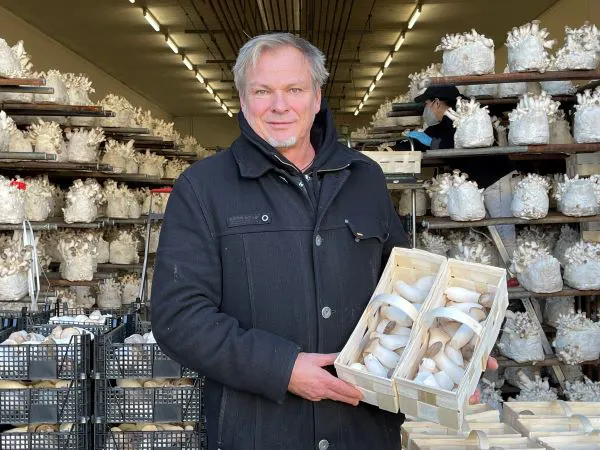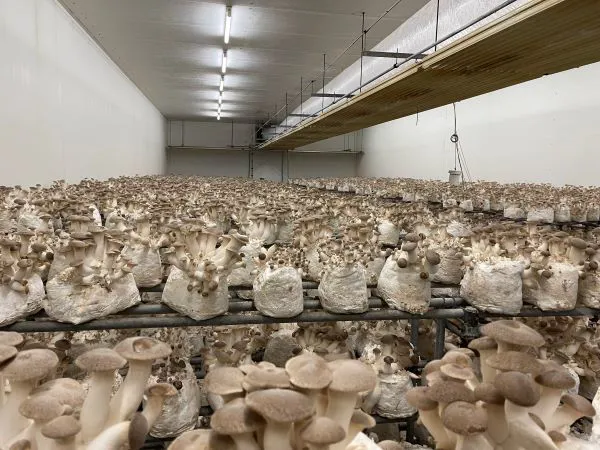"The season for king oyster mushrooms has got off to a good start. While things were still rather slow at the end of September, business has been much better since October, and the Christmas business is also gradually picking up," says Torsten Jonas, Managing Director of Pilzgarten GmbH from Helvesiek. Founded in 1996, the company specializes in the production of organic edible mushrooms in accordance with Demeter guidelines. Before switching to the Demeter association, the company was still part of the Naturland association until 2009.
 Torsten Jonas.
Torsten Jonas.
Sustained demand
"The demand for king oyster mushrooms has remained high since 2006. The product has developed extremely well during this time. This is not least thanks to imports from South Korea over the last ten years. This has enabled king oyster mushrooms to establish themselves well," says Jonas. The company produces six to eight tons of king oyster mushrooms per week. "We only offer wood-decomposing mushrooms, in other words: almost everything except mushrooms and wild mushrooms. Our range also includes exotic varieties such as velvet caps, PomPom Blanc and red, yellow and gray oyster mushrooms. However, the quantities produced of these exotics are also significantly smaller."
High price level
According to Jonas, the prices for king oyster mushrooms and other products are at a high level. "The increased costs are also making it difficult to maintain prices. I would be surprised if other producers - regardless of what they produce - didn't experience the same situation. After all, mushrooms are a very labor-intensive product, which is reflected in the high wages," Jonas points out. "Energy costs have eased somewhat, but we are nowhere near the pre-war level. Raw material prices have also fallen slightly since the overheated situation last year, but remain significantly more expensive than in 2021. However, we will never get back to the old prices." The mushroom grower was only able to pass on his costs to a limited extent.
 Three tons of king oyster mushrooms, about to be harvested.
Three tons of king oyster mushrooms, about to be harvested.
Attention-getter "rose king oyster mushroom"
Although there is great interest in rose and lime king oyster mushrooms, cultivation is only possible through cross-subsidization. "The shelf life of rose king oyster mushrooms is extremely limited. I can't imagine that king oyster mushrooms will be as big a hit as king oyster mushrooms," says Jonas. "We have a total of eleven varieties that we produce as substrates. Although king oyster mushrooms have their fans, some of whom pre-order them, sales will remain manageable. The product is more of an attention-getter. A weekly market stall would probably sell such exotic plants better. However, it is not an item that can be offered in a store display without explanation."
Better year in 2023
According to Jonas, business for his company should be better this year than in 2022. "Although the effects of inflation and other crises are still being felt, we are seeing good sales of king oyster mushrooms in particular. This has always been a very high-quality product. The target group for our products has never been the discounters. Our customers are still prepared to spend enough money on mushrooms. The vegan and vegetarian market segment has grown in recent years. This has created a new group of customers who buy our mushrooms 'produced regionally and according to Demeter guidelines' out of conviction."
Nevertheless, inflation and the fluctuating organic market continue to pose challenges. "You have to keep a close eye on the point at which consumers start to save money on products such as mushrooms." The final prices in organic stores and supermarkets can also vary considerably. Germany is still a country where many organic customers look for these products in specialist organic shops out of conviction. However, whether the organic specialist trade can maintain its role in the future depends, among other things, on whether it manages to continue to position itself at the forefront and in what way."
 For more information:
For more information:
Torsten Jonas
Pilzgarten GmbH
Fabrikstraße 12
27389 Helvesiek
Tel.: (+49) 42 67 933-0
Email info@pilzgarten.de
Website: www.pilzgarten.de
